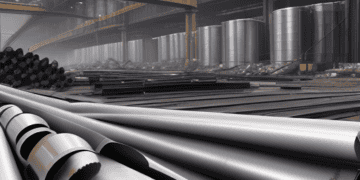In a significant development for international trade, the United States and the European Union have reached an agreement to resolve a longstanding dispute over steel and aluminum tariffs. This dispute, which has been a notable point of contention in transatlantic relations, originated with the U.S. imposition of tariffs under former President Donald Trump in 2018. The resolution of this issue, announced by U.S. officials, is poised to prevent an escalation in EU retaliatory tariffs and marks a pivotal moment in strengthening US-EU ties.
U.S. Commerce Secretary Gina Raimondo outlined that the agreement would retain the existing U.S. tariffs under “Section 232,” which are 25% on steel and 10% on aluminum. However, the deal introduces a significant change by allowing certain quantities of EU-produced metals to enter the United States without duty. This strategic move not only eases tensions but also paves the way for the U.S. and EU to concentrate on broader global trade challenges, particularly the issue of excess production capacity in steel and aluminum, predominantly emanating from China, and the imperative to reduce carbon emissions in these industries.
Valdis Dombrovskis, the EU trade chief, corroborated the agreement in a statement on Twitter, highlighting the suspension of the trade dispute and the initiation of cooperative efforts towards a sustainable global framework for steel and aluminum trade.
Details about the specific volume of duty-free steel permitted into the U.S. under the tariff-rate quota system established with the EU remain undisclosed. However, sources familiar with the negotiations indicated that annual volumes exceeding 3.3 million tons would attract tariffs. Additionally, the deal includes a provision for an extra two-year period of duty-free access, beyond the quota, for certain EU steel products that previously received exemptions from the U.S. Commerce Department.
A crucial aspect of the agreement is the requirement that EU steel and aluminum must be entirely produced within the EU to qualify for duty-free status. This “melted and poured” standard is designed to prevent the indirect import of metals, particularly from China and other non-EU countries, into the U.S. after minimal processing in Europe. Prior to the tariff implementation in 2018, Europe was exporting approximately 5 million tons of steel annually to the United States.
The deal also sets the stage for future negotiations focused on establishing a carbon-based framework for steel and aluminum trade. This approach aims to address both the overproduction issue, largely attributed to China, and the environmental impact of these industries. U.S. National Security Adviser Jake Sullivan emphasized the potential of this initiative to simultaneously safeguard the climate and support the workforce. Notably, the U.S. steel industry, predominantly utilizing electric-arc furnaces, is considered to have significantly lower carbon emissions compared to the coal-based blast furnaces prevalent in China.
President Biden has been keen on restoring and strengthening alliances with European partners, particularly in the context of collectively addressing China’s state-driven economic policies and the resultant global market imbalances caused by its excessive steelmaking capacity.
An immediate benefit of this resolution is the elimination of Europe’s retaliatory tariffs on various U.S. products, including bourbon whiskey and Harley-Davidson motorcycles, which were slated to double soon. Chris Swonger, President of the Distilled Spirits Council, expressed relief at the end of this tariff issue, which had been a dual burden alongside the pandemic for U.S. distillers. He also urged the United Kingdom to follow suit in lifting tariffs on American whiskeys.
The agreement is expected to positively impact U.S. manufacturers by mitigating steel costs, which have surged dramatically, reaching record highs and contributing to inflationary pressures. U.S. primary aluminum producers, now limited to two major companies, view the quota system as an opportunity to sustain domestic capacity revival efforts.
The American Iron and Steel Institute, through its President Kevin Dempsey, stressed the importance of the quota arrangement in preventing a surge in steel imports that could adversely affect the U.S. steel industry and its workforce. Additionally, Dempsey called for continued U.S.-EU collaboration to hold accountable countries engaging in trade-distorting policies and to explore innovative trade strategies addressing climate change.
Despite the agreement, steel exports from Britain, following its EU exit, along with those from other U.S. allies like Japan, remain subject to tariffs. The U.S. Chamber of Commerce, a longstanding opponent of the metals tariffs, advocates for the removal of these duties and quotas, particularly from close allies, to further promote international trade harmony.
Breaking supply chain news is just a click away at The Supply Chain Report. Enhance your knowledge of international trade at ADAMftd.com with free tools.
#USEUTradeAgreement #SteelAluminumTariffs #GlobalTradeResolution #Section232 #CarbonNeutralTrade #USChinaTradePolicy #SustainableMetals #DutyFreeSteel #ClimateFocusedTrade #SteelIndustryInnovation #TradeHarmony #AlliancesStrengthened















